Best time to Visit Punjab: When to Visit and not Visit!
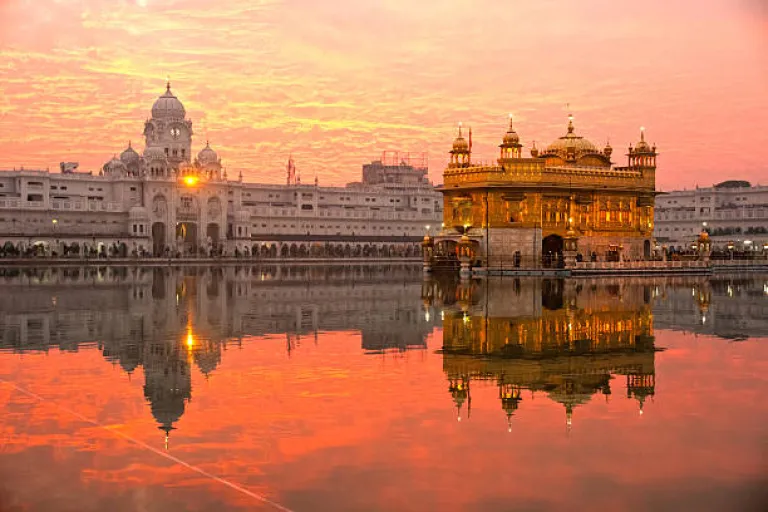
Punjab, often referred to as the "Land of Five Rivers," is not just a state but a living, breathing narrative of India's rich cultural heritage.
It is a land where every season tells a different story, the fields of mustard bloom in gold, and the rhythms of Bhangra pulse through the air like a heartbeat.
Whether it’s the serene beauty of the Golden Temple reflecting in the Amrit Sarovar or the robust flavors of Punjabi cuisine that leave your taste buds tingling, Punjab offers a journey that is as much about the spirit of the people as it is about the places.
However, to truly savor all that Punjab has to offer, timing your visit is essential.
Let's explore when this land of folklore and festivity reveals its most charming self and when it might be best to postpone your plans.
Best timing in Punjab: When to Embrace and When to Escape!
The Golden Period: October to March
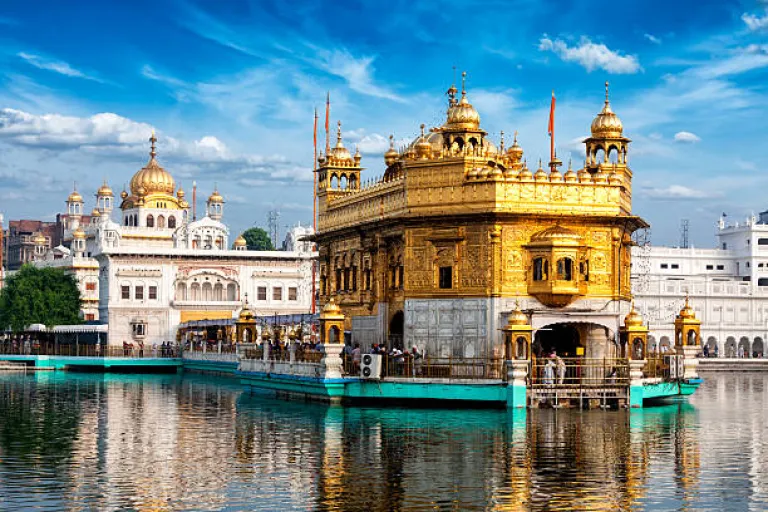 The months from October to March mark the perfect window to explore Punjab. The harshness of summer fades away, giving rise to a season that is as welcoming as the people of this vibrant state.
The months from October to March mark the perfect window to explore Punjab. The harshness of summer fades away, giving rise to a season that is as welcoming as the people of this vibrant state.
This period brings with it a delightful mix of cool breezes, clear skies, and a festive spirit that seems to linger in the air.
1. October to November (Autumn's Embrace):
Temperature: 15°C to 25°C—comfortable and soothing.
Why Visit:
As autumn sets in, Punjab transforms into a landscape straight out of a postcard. The fields are a patchwork of golden crops ready for harvest, and the weather is simply perfect for outdoor activities.
This is the season when Punjab's agricultural heart beats the loudest. Take a stroll through the villages, and you'll witness the rural life in its full glory, with farmers preparing for the harvest.
The air is filled with the fragrance of ripening crops, and the cool breeze carries with it the songs of celebration.
The vibrant festivals of Dussehra and Diwali during this time add a magical aura to the state. Diwali, the festival of lights, is particularly enchanting as every home, street, and temple glows with the soft, flickering light of oil lamps.
The joyous atmosphere, the delicious sweets, and the communal spirit make this a time when Punjab's hospitality shines brightest.
2. December to February (Winter's Warmth):
Temperature: 5°C to 20°C—crisp and invigorating.
Why Visit:
Winter in Punjab is a season of warmth—figuratively speaking. It’s the time when the chill in the air is beautifully contrasted by the warmth of Punjabi hospitality.
The mornings may start with a dense fog that blankets the fields, creating a mystical atmosphere. As the sun rises, the fog lifts, revealing the lush green fields and the majestic historical sites waiting to be explored.
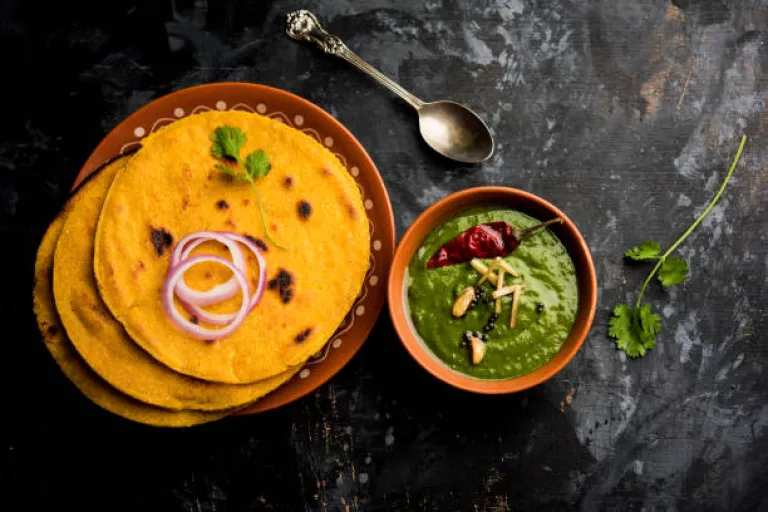 This is the season to indulge in the rich culinary heritage of Punjab. The iconic Makki di Roti with Sarson da Saag is a winter delicacy that you simply cannot miss. It’s also the season of Lohri, a festival that epitomizes the Punjabi zest for life.
This is the season to indulge in the rich culinary heritage of Punjab. The iconic Makki di Roti with Sarson da Saag is a winter delicacy that you simply cannot miss. It’s also the season of Lohri, a festival that epitomizes the Punjabi zest for life.
Also read: 15 culinary delights from Punjab that you must try
Celebrated with bonfires, traditional music, and dance, Lohri is a cultural experience that offers a glimpse into the heart of Punjab.
As the evening approaches, gathering around a bonfire with locals, listening to folk tales, and enjoying the traditional foods is an experience that stays with you long after you’ve left.
Visiting historical sites like the Golden Temple in Amritsar during this time adds an extra layer of serenity.
The temple, with its gilded façade and the tranquil waters of the Amrit Sarovar, is particularly enchanting during the winter months.
The cool weather makes it comfortable to explore the sprawling complex, and the early morning prayers resonate deeply in the calm, crisp air.
The Less Ideal Time: April to September
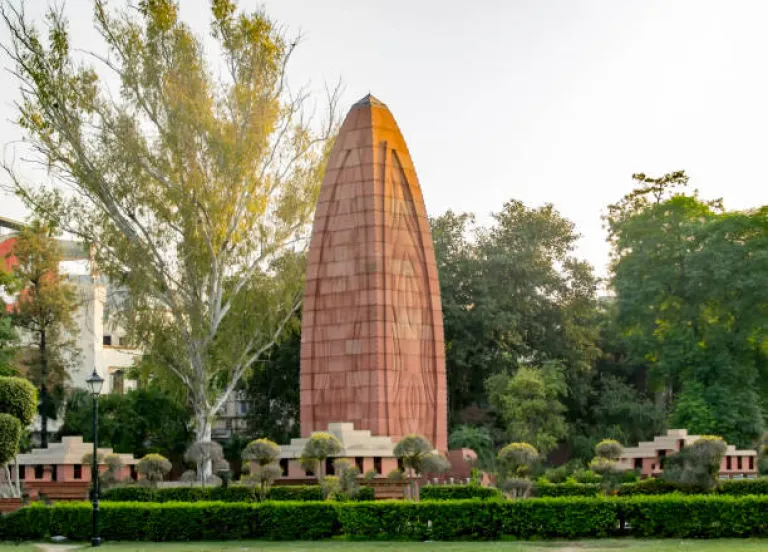 As the pleasant winter gives way to the intense summer and the unpredictable monsoon, Punjab dons a tougher, less hospitable face.
As the pleasant winter gives way to the intense summer and the unpredictable monsoon, Punjab dons a tougher, less hospitable face.
The period from April to September can be challenging for visitors, both physically and in terms of the experiences available.
1. April to June (The Scorching Summer):
Temperature: Can spike up to 45°C—intensely hot and dry.
Why You Might Want to Skip It:
The summer months in Punjab are not for the faint of heart. The sun blazes down, turning the fields into shimmering heat traps and the roads into stretches of sweltering asphalt.
The once-inviting countryside becomes a challenge to explore, with the mercury rising to uncomfortable levels.
If you’re someone who enjoys being outdoors, this is definitely not the time to visit. The heat makes it difficult to enjoy even the most picturesque locations, and many of the state’s outdoor activities come to a standstill during the peak summer months.
While the nights may bring some relief, the oppressive daytime heat often forces locals and tourists alike to retreat indoors, limiting the scope of exploration.
However, if you find yourself in Punjab during this season, there are ways to make the most of it.
Exploring the local crafts, visiting air-conditioned museums, or enjoying a traditional Punjabi meal in the cool interiors of a haveli can offer a respite from the heat.
But overall, unless you have a specific reason to visit, this period is best avoided.
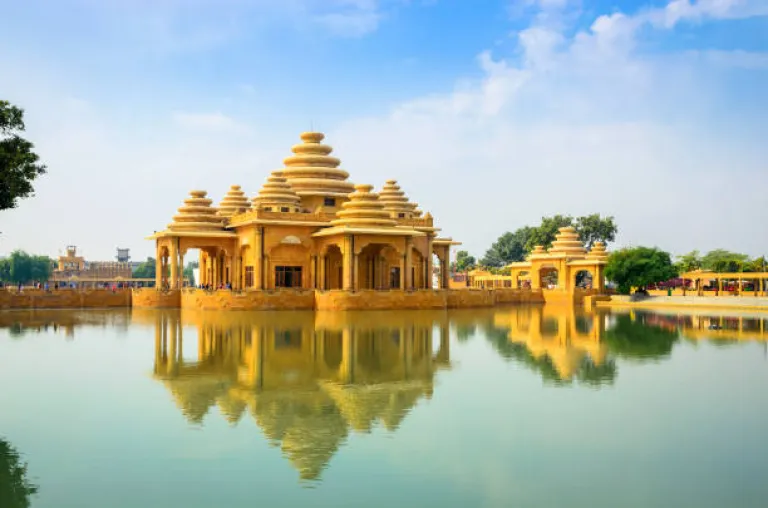
2. July to September (The Humid Monsoon):
Temperature: A humid 25°C to 35°C.
Why You Might Want to Skip It:
The monsoon season brings with it a different set of challenges. The rains, while refreshing, often lead to waterlogging and muddy conditions, particularly in rural areas.
This can make travel cumbersome and less enjoyable. The humidity during this time can also be quite oppressive, making it uncomfortable to explore Punjab’s attractions.
Moreover, the monsoon season can lead to occasional flooding in some areas, further complicating travel plans.
While the sight of rain-soaked fields and the cool breezes may seem appealing, the practicalities of traveling during the monsoon often outweigh the aesthetic pleasures.
That said, if you do happen to visit during the monsoon, there’s a certain charm in seeing Punjab’s fields turn a lush green, and the monsoon clouds rolling over the horizon can create some stunning vistas.
The cultural life in the villages continues undeterred, and you might get to experience a side of Punjab that is less touristy but equally enriching.
The smell of wet earth, the sight of children playing in the rain, and the taste of fresh corn roasted over an open flame can make for some memorable moments.
However, be prepared for the logistical challenges that come with this season.
Also read: Complete Guide to Plan a Trip to Amritsar in 2024
Conclusion
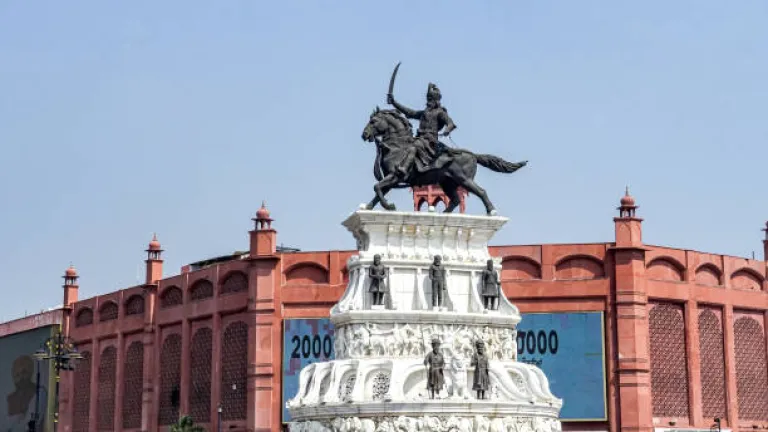 Punjab, with its rich cultural heritage, vibrant festivals, and welcoming people, is a state that leaves a lasting impression on all who visit.
Punjab, with its rich cultural heritage, vibrant festivals, and welcoming people, is a state that leaves a lasting impression on all who visit.
To truly experience the magic of Punjab, timing is everything. The months from October to March offer the most pleasant weather and the most opportunities to engage with the local culture and history.
Whether it’s the festive celebrations, the culinary delights, or the serene beauty of the countryside, Punjab during these months is a traveler’s delight.
On the other hand, the scorching summer months from April to June and the humid monsoon from July to September can make travel more challenging and less enjoyable.
While there are still experiences to be had during these seasons, they often come with discomforts that can detract from the overall experience.
If possible, plan your visit during the cooler months to make the most of what Punjab has to offer.
So, when you’re ready to embark on a journey to the heart of Punjab, choose your timing wisely, and let the state’s warmth, color, and spirit embrace you in ways you’ll remember for a lifetime.
Published at
About Author
Prerna Dixit
Subscribe our Newsletter
Get our weekly tips and travel news!
Related Posts
10 Amazing New Attractions in Singapore - Indian Travelers Guide 2025
Explore the new yet amazing attractions of Singapore
10 Best Beach Resorts in Karwar Karnataka - 2024
Escape to the tranquil beaches of Karwar, Karnataka, where luxury resorts offer a serene retreat amidst nature's pristine beauty.
10 Best Places to Visit in Mahabalipuram, Tamil Nadu
Explore the 10 Best Places to Visit in Mahabalipuram, Tamil Nadu – where ancient temples, rock-cut sculptures, and serene beaches meet!
10 Common Mistakes Every Traveler Makes
Indian travelers often overpack, skip travel insurance, and neglect local customs. Embrace light packing, smart planning, and cultural respect for a smooth and unforgettable trip.
10 Cool Summer International Destinations
Beat the Indian heat with these 10 cool summer international destinations that promise refreshing getaways and unforgettable experiences.
Latest Posts
You don't Need FASTag anymore? Everything you need to know!
No more FASTag from May 1st?
10 Dreamy Experiences for Couples in Kashmir
Fancy some romantic experiences in Kashmir?
How much will a trip to Indonesia cost from India? Travel Budget Guide
Need to budget a tropical getaway from India to Indonesia?
Indian Traveler's 7 Day Itinerary for Island Hopping in Indonesia
Your perfect Indonesian island getaway guide is here!
Best 4-Day Itinerary for Kashmir, India
Ready to fall in love with Kashmir in just four days?

